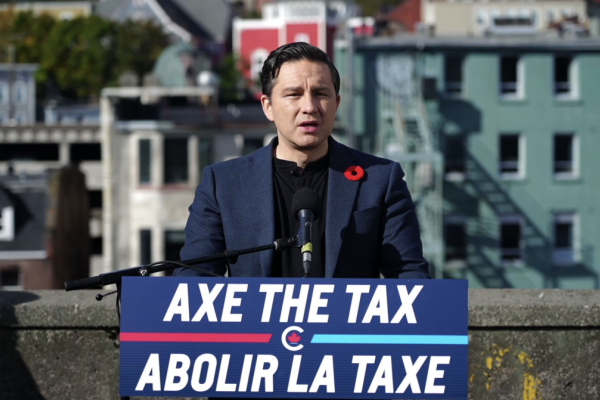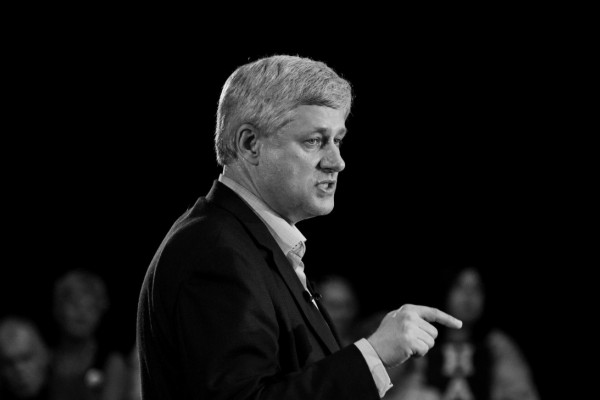Will Poilievre’s pro-Trump past boost an ailing Liberal Party?
Tory leader’s sinking electoral fortunes show that his history of MAGA-style politics may be rubbing the public the wrong way

US President Donald Trump’s annexation threats and looming tariffs have become topic number one in Canadian political discourse. To some degree, Trump’s threats and insults have reinvigorated debates within Canada about nationalism, self-reliance, and Canadian dependence on trade with the US. They have also contributed to a shift in the momentum of Canadian electoral politics, throwing the Conservatives off-balance and pushing some wind into the sails of an ailing Liberal Party.
According to polling firm Ipsos, the Liberals have gained eight points since early January while the Conservatives are down five. The firm’s long-term graph shows a steady rise in support for the Conservative Party starting in February 2023, and a steady drop in support for the Liberals beginning at the same time. The gap mostly widened until January of this year, as Trump turned Canada into a rhetorical punching bag.
Canadians will heading to the ballot box this year.
— Ipsos Public Affairs (@ipsospa) February 6, 2025
The Liberal Party of Canada has gained some ground since Prime Minister Justin Trudeau announced he’ll be resigning, but the Conservatives remain well ahead if an election were held tomorrow? https://t.co/RwjfdLybxY pic.twitter.com/OFEmL7W8lp
In the immediate aftermath of Trump’s tariff threat in December, it seemed the biggest victims were the Liberals. After all, the threat exposed rifts in Trudeau’s cabinet and the weakness of his leadership. Former Deputy Prime Minister and Finance Minister Chrystia Freeland used the tariffs as political fodder to increase pressure on Trudeau and hasten his resignation before launching her own campaign for party leadership. As the leadership race got underway, the main candidates, Freeland and former Bank of Canada Governor Mark Carney, looked uninspiring and too close to Canada’s widely unpopular PM. The Conservatives grew their lead even more.
But in January, the tide turned. As Trump launched his trade war on Canada, the Liberal Party outplayed the Conservatives. In his February 2 speech announcing retaliatory tariffs, Trudeau stressed unity, stating, “We will stand strong for Canada… The Canadian government, Canadian businesses, Canadian organized labour, Canadian civil society, Canada’s premiers and tens of millions of Canadians from coast to coast to coast are aligned and united.”
In his own response that day, Conservative leader Pierre Poilievre condemned US actions while at the same time reiterating campaign promises that sounded very similar to policies on which Trump ran. He used the phrase “Canada First,” spoke about the need for Canada to “take back control” of its border, and criticized Trudeau’s “dumb decisions” on oil and gas. Slowly but surely, the Liberals began eating away at the Conservatives’ once-dominant lead.
This is not to pretend the ruling government’s response to Trump has been adequate. Behind the nationalist posturing, their efforts to appease Washington are clear. The Liberals have attempted to appeal to the Trump administration as “friends” while highlighting Canadian support for imperialist US wars in Korea and Afghanistan. Chief of Defence Staff Jennie Carignan refused to answer questions about why she considered Iran, Russia, North Korea, and China threats to Canada, but not a US administration that promised to use “economic force” to annex Canadian territory and resources. Furthermore, Trudeau catered to Trump’s whims by announcing, in exchange for a 30-day pause on the tariffs, $1.3 billion in spending on a “border plan” aimed at stemming negligible flows of fentanyl from Canada into the US.
While the Liberals may yet squander their sudden electoral momentum (they are not exactly known for political adroitness), Conservative leader Pierre Poilievre’s sinking political fortunes show that his history of cozying up to Trump and MAGA-style politics may be rubbing the public the wrong way. As “Buy Canadian” gains steam and Canadians boo the US national anthem, the Conservatives’ ideological sympathy with Trump and the MAGA movement may become a political burden.
During an interview with Jordan Peterson in early January, Poilievre praised Donald Trump as the president-elect’s trade war on Canada loomed: “He spent his life as a highly successful businessman in the most cutthroat economic environment in the world, New York City.” He asserted that Washington and Ottawa have the same geopolitical enemies and called for a deeper trade relationship between Canada and the US. Poilievre baselessly described Trudeau as an “authoritarian socialist” and promised to emulate Trump’s governing style in Canada by “putting Canada first.”
It is telling that Poilievre expressed ideological sympathy with Trump when the US president’s expansionist eye fell elsewhere, like Greenland and Panama. Shortly after the Peterson interview, however, Trump threatened to annex Canada as well. Now Poilievre’s efforts to align himself with Trumpism appear to be backfiring.
Some in Canada’s conservative movement have publicly expressed their admiration for Donald Trump. In 2021, for example, former federal Conservative leader and Manitoba MLA Candice Bergen was photographed wearing a “Make America Great Again” hat. Others on the Canadian right, such as Alberta Premier Danielle Smith and BC Conservative leader John Rustad, have called for Canada to roll over and give Trump what he wants. But that approach is not resonating with Canadians, and the right is noticing the shift. On January 31, The Hub published an opinion piece titled “It’s time for Canadian conservatives to abandon Donald Trump.” Meanwhile, the Conservative Party is scrambling to adapt its messaging amid falling poll numbers.
Poilievre had an easy time running against an unpopular Liberal incumbent he could use as a dart board for empty right-wing labels like “woke” or “authoritarian socialist.” But running against an out-of-control Trump administration that has its eyes on Canadian resources and the ideological sympathy of a large part of the national conservative movement? That has proven much harder for him.
Owen Schalk is a writer from rural Manitoba. He is the author of Canada in Afghanistan: A story of military, diplomatic, political and media failure, 2003-2023 and the co-author of Canada’s Long Fight Against Democracy with Yves Engler.










